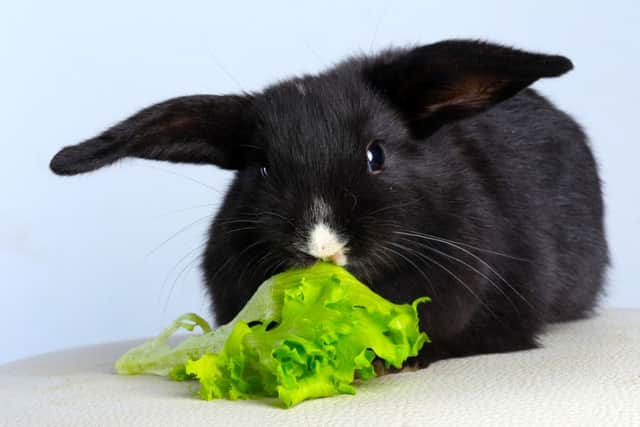Lettuce is dangerous for rabbits: bunny foods to feed and avoid


Despite the traditional image of our floppy-eared friends nibbling on rocket and iceberg, or the iconic Bugs Bunny pose with carrot in paw, root vegetables should not be at the top of the shopping list when it comes to your bunny’s diet – and lettuce, which is actually dangerous to rabbits, should not even feature.
As part of Rabbit Awareness Week – an annual campaign to raise the profile of rabbit welfare – Lucy Ross, Head of Training at Pets Corner, outlined what constitutes a safe and healthy diet for rabbits so you can keep your pet in tip top condition.
Advertisement
Hide AdAdvertisement
Hide Ad“We are all familiar with Bugs Bunny, who would regularly whip out a carrot to munch on,” Lucy said, “but carrots are not the best thing to be feeding rabbits on a day-to-day basis.
“The bulk of a rabbit’s diet should be made up of hay with 10% of what they eat comprising of vegetables. For example, curly kale is among some of the veggies rabbits can enjoy on a daily basis.
“But iceberg lettuce – a popular staple among humans that can often make it into the pet food pile is dangerous and should never be fed to rabbits.”
A healthy diet for a pet rabbit should mimic what his cousins in the wild forage for – grass, plants and vegetables.
Advertisement
Hide AdAdvertisement
Hide AdGood quality hay is an excellent alternative to grass and the foundation of a healthy diet for pet rabbits. As well as strengthening teeth and jaws, it provides fibre to maintain a healthy gut and nibbling on hay keeps bunnies busy, reducing boredom and helping prevent behavioural problems.
Lucy continued: “Alongside hay, which should make up 80% of your pet’s diet, we recommend adding one and a half mugs of fresh, raw fruit and veg per rabbit every day with complete nuggets and mix making up the remaining 10%.”
Here’s five tips for keeping your rabbit healthy:
Feed often – most days: bell peppers (remove seeds), raspberry leaves, watercress, coriander, courgette, curly kale
Feed frequently – two to four times a week: parsley, blueberries, cabbage, cauliflower leaves, broccoli, tomato (not stems or leaves), mangetout, Brussels sprouts
Advertisement
Hide AdAdvertisement
Hide AdFeed occasionally – once a week: apple (remove seeds), mint, carrots, pak choi, blackberries, cucumber peelings, dandelion leaves, celery
Never feed: avocado, coconut, garlic, iceberg lettuce, hot peppers, chillies, potatoes, tomato leaves and stems, onions
Fresh water – always ensure your rabbit has plenty of fresh, clean water
The Rabbit Welfare Association and Fund – a national charity supported by Pets Corner – advocates the hay and veggie diet. However, it advises commercial foods should not be cut out as they contain important nutrients that can be deficient in a totally hay/veggie diet.
Advertisement
Hide AdAdvertisement
Hide AdLucy added: “Take care to introduce any new foods gradually. An abrupt change to a rabbit’s diet can trigger digestive upsets, which could prove fatal to some.”
Rabbit Awareness Week runs until Sunday 26th June - moe at www.rabbitawarenessweek.co.uk